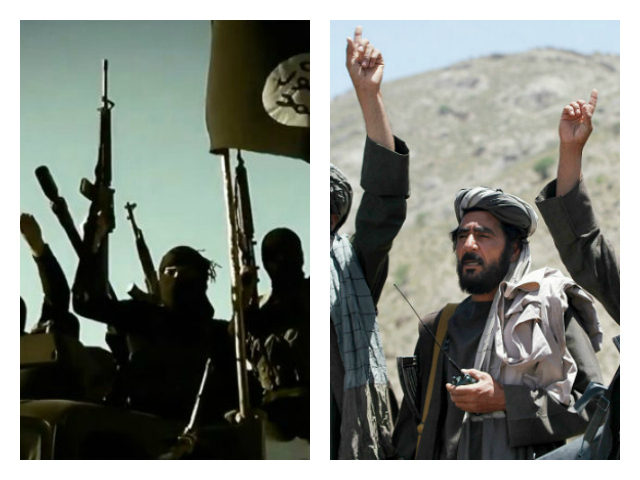The Taliban and its Islamic State (ISIS/ISIL) foes have increasingly clashed in Afghanistan during the last week as the United States intensified its efforts to convince Taliban jihadis to bring America’s most protracted war to an end.
Since July 12, ISIS-Taliban clashes have left at least 80 jihadis dead or wounded.
On Tuesday, an ISIS suicide bomber targeted the funeral of a Taliban group leader in northern Afghanistan, where the two terrorist groups have been competing for territory and influence for months, leaving at least 20 militants dead or wounded.
Citing an Afghan military spokesman, Khaama Press (KP) reports:
[A] number of Taliban militants had participated in the funeral ceremony of a Taliban leader Shir Mohammad Ghazanfar when [an] ISIS suicide bomber detonated his explosives. He said the Taliban leader was killed during the clashes with the ISIS militants on Monday and one of his brothers was also killed in today’s attack.
Fatality estimates for the incident, which took place in the northern province of Sari Pul, vary between 15 and 22, KP notes.
The recent ISIS-Taliban confrontations came after the two groups clashed in northern Jawzjan last week, leaving 62 terrorists dead (26) or wounded (34).
As the U.S.-led coalition and local forces push the remnants of ISIS out of its former caliphate in Iraq and Syria, the terrorist group has made at least two attempts this year alone to establish another emirate in Afghanistan.
However, ISIS has suffered significant setbacks in recent days at the hands of the Taliban and the U.S.-backed Afghan National Defense and Security Forces (ANDSF).
For months, the ANDSF, which includes police and military units, has been fighting to push ISIS out of eastern Afghanistan’s Nangarhar province, the group’s primary stronghold in the country.
The American military reportedly vowed to intensify its combat operations against ISIS amid an unprecedented U.S.-backed ceasefire between Kabul and the Taliban last month that excluded the Islamic State.
ISIS attacked the Taliban and Afghan security forces as they feasted together during the truce in celebration of the Eid holiday that marks the end of the Muslim holy month of Ramadan.
U.S. President Donald Trump’s administration has made “reconciliation” between the Taliban and Kabul the top goal of its Afghan war strategy.
Trump’s secretary of state, Mike Pompeo, has indicated that the U.S. is willing to discuss the future of foreign forces in Afghanistan as part of negotiations to end the war.
American officials have stepped up diplomatic efforts towards peace negotiations since the historic ceasefire in June.
On Sunday, the New York Times (NYT) reported that the Trump administration had ordered its top diplomats to seek direct talks with the Taliban, marking a significant departure from U.S. policy long sought by the narco-jihadi group.
However, U.S. Gen. John Nicholson, the top commander of American and NATO forces, said in a statement on Monday that the international mission is not ready for direct talks with the Taliban, insisting that Kabul must lead and own the process.

COMMENTS
Please let us know if you're having issues with commenting.